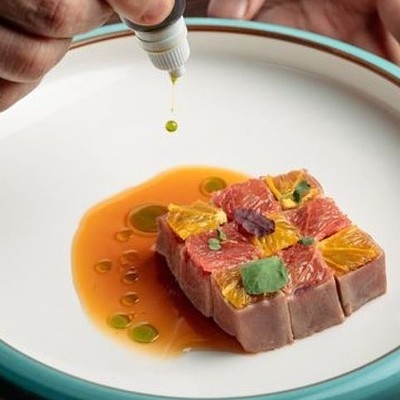Two weeks ago, we ran a list of the 20 most commonly mispronounced food words that we run across day in and day out. You, dear readers, went nuts and proceeded to forward and Facebook the link far and wide in what we can only imagine was a frenzy of "HERE UNCLE FRANK, THIS IS HOW YOU PRONOUNCE QUESADILLA FOR CHRIST'S SAKE"-inspired passion.
Thank you for that.
But a list of only 20 words was, naturally, far too short to include some of your other favorite Malaprops or mispronunciations. Many readers left their own suggestions in the comments section.
Said commenter Mississippi Queen: "Someone needs to tell Guy Fieri how to properly pronounce balsamic - he says ba-sal-mic."
And commenter Trisch added even more: "Other mispronunciations I often hear: Mascarpone pronounced as "mars-capone." Ceviche pronounced as "sir-veetch-ee." Peking duck as "peek-ing duck" (and for that matter, the city of Beijing as "bay-zhing"). Paella "pah-eh-ler" (must be a British thing)."
So in the interest of correct pronunciation everywhere, here's a list of 20 more commonly mispronounced words for your parsing pleasure.
As with last time, all pronunciations are taken from the Merriam-Webster dictionary and my super-handy copy of the Food Lover's Companion by Sharon Tyler Herbst.
Anise/star anise: These two herbs may share a common name and a similar flavor, but they're actually two different plants entirely. Regardless, the "anise" in both is pronounced the same way. Proper pronunciation: AN-iss
Bouillon: Not to be confused with (or pronounced like) gold bullion, this is a clear, meat- or vegetable-flavored broth that's used as the base of soups and stews. Proper pronunciation: boo-YAWN
Niçoise: Anything cooked or served à la niçoise simply means that it was done after the style of Nice, France, which usually involves tomatoes, olives, onions and garlic. Proper pronunciation: nee-SWAHZ, in the simplest sense (that is, without getting into French grammatical genders)
Charcuterie: In its most basic sense, charcuterie refers to the products made from breaking down pork and sometimes beef, products ranging from terrines and rilletes to hard sausages and whole legs of ham. Proper pronunciation: char-COO-ter-ee (listen to both the English and French pronunciations)
Prosciutto: Speaking of charcuterie, here's one of the art's most popular products. Most prosciutto you see in Houston comes from Italy, the majority of it from San Daniele or Parma. But more and more restaurants are making their own in-house, although it's a very time-consuming process. Proper pronunciation: proh-SHOO-toh
Macaron/macaroon: Macarons are delicate, meringue-like French pastries made from egg whites and almond powder. Macaroons are dense cookies made from shredded coconut. They are not the same thing, nor are the pronounced the same way. Proper pronunciation: mahck-eh-rohn (the last syllable should sound like you're about to say "rohng" but dropped the "G" at the last minute)/mack-ah-ROON
Mirepoix: An extremely basic mixture of diced carrots, onions and celery sauteed in butter, sometimes with herbs, which is used for anything from making sauces and soups to bedding for a braised piece of meat. Proper pronunciation: mir-PWAH
Crème fraiche: Despite the fact that is has "fresh" right there in the name, crème fraiche is actually matured, thickened cream with a refreshing, tangy flavor. Proper pronunciation: krem FRESH
Filé: The hint is in the accent mark for this Cajun thickening powder made with dried, ground sassafras leaves and used in place of (or in addition to) okra in gumbo. Proper pronunciation: FEE-lay
Mole: On the other hand, there should be an accent mark over the "E" in this word, but there isn't. Just remember that "chicken mole" sounds disgusting, whereas "chicken MOH-lay" sounds delicious. Proper pronunciation: MOH-lay





